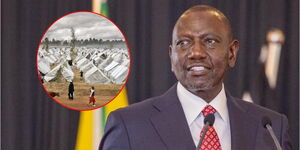Members of the National Assembly Committee on Environment, Forestry, and Mining have made new recommendations to be included in the Meteorological Bill 2023, including the incorporation of traditional forecasting methods in the legislation.
Speaking while reviewing the proposed amendments, committee vice chair Charles Kamuren and Turkana Central MP Joseph Emathe suggested that Traditional Indigenous Knowledge (TIK) be used to leverage how the Kenya Meteorological Department forecasts the weather.
According to MP Kamuren, the methods have been proven to work and thus should be rightfully included in the bill.
"The issue of indigenous knowledge is important here. We can't rule them out. The traditional weather forecast, where some communities predict the weather by looking at animal intestines or the movement of birds, has proven to be accurate. There is a need to incorporate it in this Bill," he stated.
In Kenya, different communities have their own ways of forecasting weather, including monitoring animal and plant patterns in the region. In most cases, this often aligns with the economic activities of the region.
For instance, in indigenous pastoralist communities in Baringo County, they predict weather conditions by slaughtering a goat and examining its intestines and feed leftovers.
The pastoralists believe that this helps to tell them when and where the rains will fall.
In other communities, the lack of dew on the grass in the morning is an indicator that it will rain that day, and in others, the colour and shape of clouds, as well as the patterns of stars, are used to predict the weather.
Due to the proven track record of these measures, the Kenya Meteorological Department introduced the Participatory Scenario Planning (PSP), a mechanism for collective sharing and interpretation of climate information for informed decision-making tailored to specific communities.
Through these sessions, farmers and pastoralists gain essential meteorological information to guide crop type and variety selection and livestock management.
If the recommendations by MPs are taken into consideration, it could lead to confusion, as the proposed Kenya Meteorological Amendment Bill 2023 seeks serious repercussions for people who forecast the weather without a permit.
Sponsored by the Senate Majority Leader, Aaron Cheruiyot, it seeks a five-year imprisonment, Ksh5 million in fines or both, for anyone caught doing the same.
"A person who engages in any meteorological observations, weather forecasting activities or weather modification activities without a permit commits an offence and shall be liable upon conviction to a fine not exceeding five million shillings or to imprisonment for a term not exceeding five years or both such fine and imprisonment," part of the amendment reads.












